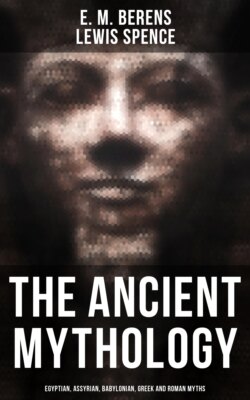Читать книгу The Ancient Mythology: Egyptian, Assyrian, Babylonian, Greek and Roman Myths - Lewis Spence - Страница 22
На сайте Литреса книга снята с продажи.
Berossus' Account of the Deluge
ОглавлениеMore important is his account of the deluge. There is more than one Babylonian version of the deluge: that which is to be found in the Gilgamesh Epic is given in the chapter dealing with that poem. As Berossus' account is quite as important, we shall give it in his own words before commenting upon it: "After the death of Ardates, his son (Sisuthrus) succeeded and reigned eighteen sari. In his time happened the great deluge; the history of which is given in this manner. The Deity, Cronus, appeared to him in a vision; and gave him notice, that upon the fifteenth day of the month Dæsius there would be a flood, by which mankind would be destroyed. He therefore enjoined him to commit to writing a history of the beginning, procedure, and final conclusion of all things, down to the present term; and to bury these accounts securely in the City of the Sun at Sippara. He then ordered Sisuthrus to build a vessel, and to take with him into it his friends and relations; and trust himself to the deep. The latter implicitly obeyed: and having conveyed on board every thing necessary to sustain life, he took in also all species of animals, that either fly, or rove upon the surface of the earth. Having asked the Deity whither he was to go, he was answered, To the gods: upon which he offered up a prayer for the good of mankind. Thus he obeyed the divine admonition: and the vessel, which he built, was five stadia in length, and in breadth two. Into this he put every thing which he had got ready; and last of all conveyed into it his wife, children, and friends. After the flood had been upon the earth, and was in time abated, Sisuthrus sent out some birds from the vessel; which not finding any food, nor any place to rest their feet, returned to him again. After an interval of some days; he sent them forth a second time: and they now returned with their feet tinged with mud. He made trial a third time with these birds: but they returned to him no more: from whence he formed a judgment, that the surface of the earth was now above the waters. Having therefore made an opening in the vessel, and finding upon looking out, that the vessel was driven to the side of a mountain, he immediately quitted it, being attended with his wife, children, and the pilot. Sisuthrus immediately paid his adoration to the earth: and having constructed an altar, offered sacrifices to the gods. These things being duly performed, both Sisuthrus, and those who came out of the vessel with him, disappeared. They, who remained in the vessel, finding that the others did not return, came out with many lamentations and called continually on the name of Sisuthrus. Him they saw no more; but they could distinguish his voice in the air, and could hear him admonish them to pay due regard to the gods; and likewise inform them, that it was upon account of his piety that he was translated to live with the gods; that his wife and children, with the pilot, had obtained the same honour. To this he added, that he would have them make the best of their way to Babylonia, and search for the writings at Sippara, which were to be made known to all mankind. The place where these things happened was in Armenia. The remainder having heard these words, offered sacrifices to the gods; and, taking a circuit, journeyed towards Babylonia." Berossus adds, that the remains of the vessel were to be seen in his time upon one of the Corcyrean mountains in Armenia; and that people used to scrape off the bitumen, with which it had been outwardly coated, and made use of it by way of an antidote for poison or amulet. In this manner they returned to Babylon; and having found the writings at Sippara, they set about building cities and erecting temples; and Babylon was thus inhabited again.
